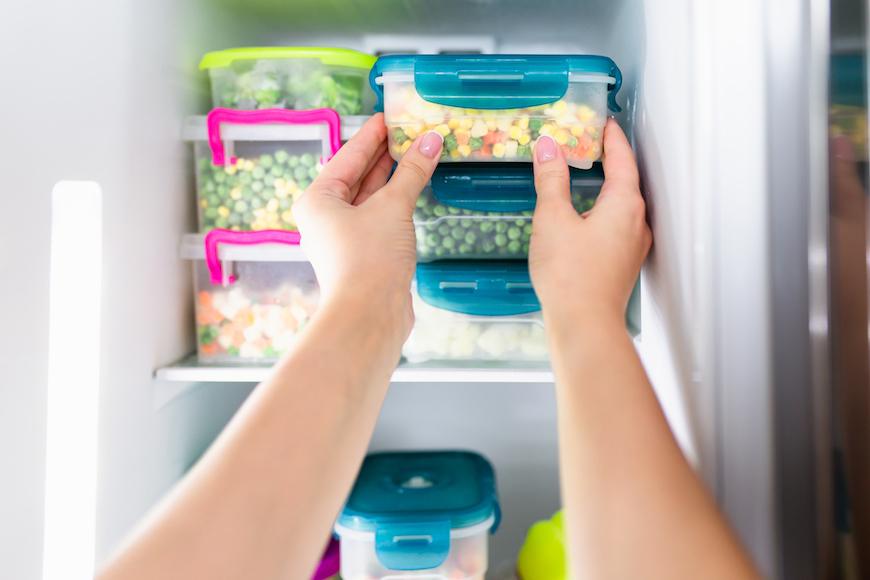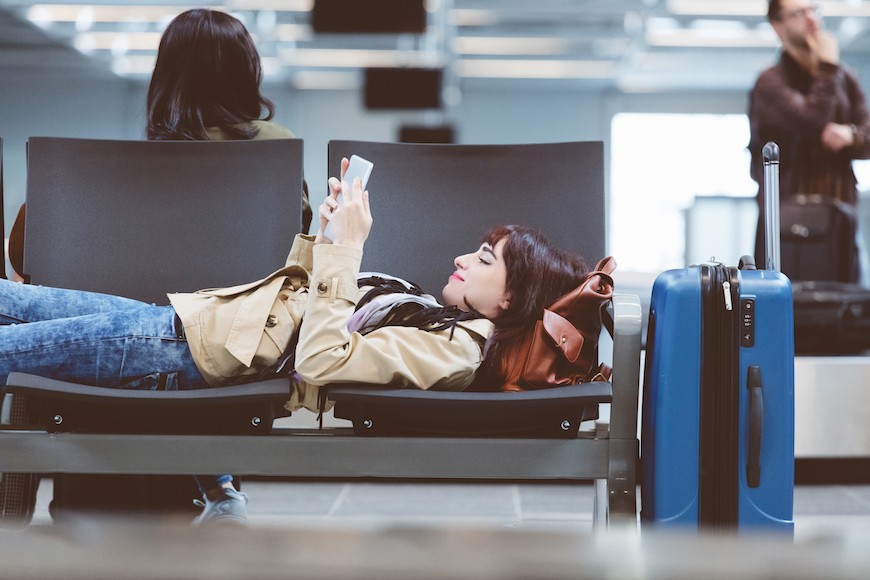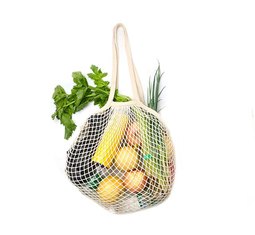Sustainable Travel Tips to Keep Your Vacays Great Without Compromising the World You Want to See
But before you despair becoming a hypocrite who petitions lawmakers to take climate change seriously while simultaneously planning as many trips as possible for 2019, take comfort in knowing that even environmentalists travel—they simply do so mindfully. Below, experts share their tried-and-true eco-friendly tips for reducing your carbon footprint on the road. And remember, as with most things that are green, the simple steps aren't only kind to the environment, but also to your wallet and your health.
Keep reading to reduce the environmental impact of your 2019 travels.

Before you go
1. Donate or freeze leftover fresh foods
It can feel nearly impossible to plan pre-vacation groceries perfectly; somehow, something is almost always leftover to rot in the fridge. While these wasted veggies, fruits, or animal proteins might amount to just a few dollars of lost cash, such food waste has a more significant environmental cost. According to Kathryn Kellogg of Going Zero Waste, 20 percent of the food in America goes to landfills, where it's unable to decompose because it's trapped by inorganic matter (e.g. trash bags). These preserved organics then release methane, which is a huge contributor to climate change.

{{post.sponsorText}}
To minimize your contribution to this problem, zero-waste expert Celia Ristow of Litterless suggests donating any food that might otherwise get trashed to friends or neighbors before you leave town. "I show up to most friend dates prior to a trip with limes, avocados, and onions in my bag to try to foist on my pals," she says. "They love it."
Another, more budget-friendly, option is to preserve everything for later use, adds Manuela Baron of sustainable and conscious-lifestyle blog Girl Gone Green. "You can freeze your herbs, peeled fruits, and chopped veggies," she says. "Save your vegetable scraps in the freezer to make vegetable stock when you get back." Or, juice leftover fruits and veggies before you leave for a healthful pre-flight boost.
2. Put your home to sleep
Prior to hitting the road, you'll also want to make sure to turn off all lights and unplug—not just turn off—your electronics.

Packing
1. Only bring a carry-on
The lighter your suitcase, the less you're taxing the plane and therefore the more efficiently it can fly. Plus, as Lauren Singer of Trash Is for Tossers points out, those little checked luggage stickers create unnecessary waste—as do disposable luggage tags (invest in a chic reusable one!) and printed boarding passes (download your airline's mobile app!). So, limit your load to a carry-on whenever possible. Not sure how to fit it all in? Karlie Kloss has a few ideas.
2. Include a zero-waste kit
To enable waste reduction on the road, pack a few go-to reusable products. "I bring a water bottle, sometimes a thermos for tea, reusable utensils, a cloth napkin, handkerchiefs, a reusable container for snacks or leftovers or compost, and a menstrual cup," says Ristow. "Armed with that, I can avoid most trash, and the small bits and pieces I do get I try not to worry about." To this list, Baron adds bringing reusable grocery bags. Check out some must-haves below to fill your own zero-waste kit.
Your zero waste travel kit
3. Download books
Once again, the lighter your load, the less fuel the plane will burn. And sure, your one or two books aren't going to make a huge difference, but every little bit helps. Plus, your shoulders will thank you for the lessened load.
Getting There
1. Choose eco-friendlier options than flying...sometimes
Air travel is a huge contributor to climate change, so one effective way to reduce your carbon footprint while wanderlusting is to opt for alternative modes of transportation when available. According to Amtrak, rail travel is 12 percent more efficient than domestic air travel (on a per-passenger scale by mile)—so sold-out trains are environmentally better than sold-out planes, period. The same can't be said, however, for car travel—unless you're driving an electric or hybrid model, riding with other passengers, or going only a short distance. Otherwise, your impact on the environment can actually be more significant if you drive rather than fly.
2. Fly nonstop
One of the easiest ways to limit the number of flights you take is to book nonstop whenever possible. Though this is often a more expensive option and only available depending on your desired destination, when it's possible and you can swing it, doing so will save you in sanity (layovers suck!) while protecting the priceless environment.
3. Refuse in-flight goodies
Between food, drinks, and plastic-wrapped pillows and blankets, a lot of waste is generated during flights—but Ristow says a lot of these culprits are easy to avoid or minimize. "I fill a water bottle after security and bring it on the plane, and I also travel with a scarf and neck pillow to obviate the need for unwrapping the airline's pillows and blankets," she says. On long or transatlantic flights, she brings several reusable water bottles, she tells me, because some airlines won't refill your water bottle for you (and even if they do, the H2O comes from a single-use plastic bottle anyway). For food, she says, she plans out what she needs and tries to bring enough so that she doesn't have to eat the plastic-wrapped snacks the airline hands out.
Baron's airline nourishment of choice includes edamame, nuts and seeds, muffins, bagels, sandwiches, and fruit (consumed before boarding an international flight)—all packed in reusable containers. For flights longer than five hours, she'll pack a full meal—in a reusable container, of course.
At the hotel
1. Choose eco-friendly accommodations
Convenience often comes at the expense of the environment, and hotels offer nothing if not convenience. Some, however, are implementing systems to reduce the severity of their impact. For instance, the Sheraton Hotel in San Diego turns 100 percent of its food waste into compost. (Ahem, other Sheratons! Follow suit!) The Vancouver-based Listel Hotel, meanwhile, utilizes solar panels and a heat-capture program to reduce its energy footprint, features restaurants that boast sustainable, local menus, and has been zero waste since 2011. Then there's the 1 Hotel Brooklyn Bridge, which runs entirely on wind power, utilizes a rainwater reclamation system, and does not offer a single plastic water bottle anywhere on-site. (Other properties in the 1 Hotel group, are likewise environmentally friendly.) And at the Andaz Maui at Wailea Resort, the first LEED-certified property in all of Hawaii, food waste is composted for gardening, and glassware is made from recycled wine bottles.
If you can't find an eco-conscious accommodation, consider booking an Airbnb or other rental property—generally considered to be the greener option—instead. According to one study, Airbnb guests in North America saved 270 Olympic-size-pools worth of water and reduced greenhouse gas emissions equivalent to 33,000 cars in just one year.
2. Pack your own toiletries
You check in to a hotel, use the mini toiletry bottles once or twice, and leave—what happens next? According to Clean the World, an organization that upcycles soaps and toiletries from hotels to those who could use them, these bottles are destined for the garbage.
Though some hotels are moving away from individually-packaged toiletries in favor of dispensers that can be refilled while others are working to recycle their minis—(though plastic recycling is a bit of a myth)—you can't count on either scenario when you travel. To avoid the unnecessary waste generated by your short-term toiletry use, Ristow recommends bringing your own shampoo, conditioner, soap, etc. "I keep [my soap] in a travel tin that comes with me on every trip, so I never have to unwrap a small plastic-packaged bar of hotel bathroom soap," she says. "The same thing goes for shampoo and conditioner—bringing your own from home, decanted into reusable containers, is definitely the way to go."
3. Recycle your in-room trash
Since it's rare to see a recycling bin inside a hotel room, Ristow recommends taking things into your own hands. "Save papers and other recyclables to recycle in the lobby or while out and about."
4. Ask for help
Hotel employees, Baron reminds me, aim to make your stay as comfortable as possible—so you can enlist them to help you in your eco efforts. "I’ll ask the hotel to bring me filtered water in a pitcher instead of plastic water bottles," she says. "I also make sure to let cleaning staff know not to change my linens every day."

Out and about
1. Carry your zero-waste kit everywhere
Or, at least, some version of it. Baron tells me she usually brings just her water bottle and reusable fork, though sometimes, if she knows she's going to be eating street food at a festival or a market, she'll bring a metal food container as well.
2. Eat like the locals
Sad but true: if you're eating sushi in Florence, it was probably flown in from various parts of the world and therefore carries a sizable carbon footprint. To avoid this, eat what the locals eat whenever possible, says zero-waste expert Anita Vandyke. If you're staying in an accommodation with a kitchen, look for fresh produce in small markets to cook at home for at least some percentage of your trip.
3. Learn key phrases in the local language
Unless you're visiting California, odds are your drinks will be served with straws, your to-go food will come in tons of packaging, and the shop clerk will hand you a single-use bag. In order to avoid awkward rejections or waste you can't stop in time, Vandyke suggests learning a few key phrases in the local language, e.g. "No straw, please."
4. Sightsee by bike
One of the best ways to see a city is by bike, and it just so happens to be one of the most eco-friendly, too. Many cities offer bike tours that can give you insights you may not have gained if you solely traveled via taxi. You can often rent bikes to explore on your own as well. If you must use four-wheeled transport while out and about, opt for public transportation versus private car whenever possible (it's good advice to implement at home, too!). Or, take a Lyft—its carbon neutral!
Wanna replace your planes with trains? Start with this epic cross-country trip. Or, you could always go wheels-free and hike to Canada.
Loading More Posts...






